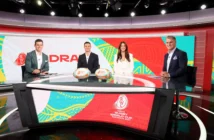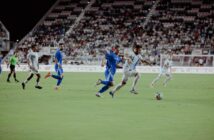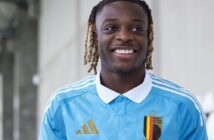I remember exactly where I was on Sunday June 22nd, 1986. We were seven hours ahead from Estadio Azteca, in Mexico DF, the scene of the of what became to be known as the “goal of the century”.

Photo: Wikipedia
My family had emigrated to Barcelona from Argentina in the late 70s. It was a Sunday evening at home. I was just 13 years old, and we were just about the house.
My father, Buenos Aires born and a former player, my mom, and my self. No jerseys or flags, wearing slippers and sweats on a lazy Sunday.
Don’t let the casual scene fool you, we were simmering with that highly flammable mixture of euphoria and panic that comes before a match of that stature.
We were to play England for quarter finals of the Mexico1986 world cup.
We were glued to the TV as Diego Maradona, claiming divine help, put the first goal on the scoreboard to the English squad despair, you could feel the English squad’s frustration.
Minutes later, midfielder Héctor Adolfo Enrique gave Maradona a simple short pass far in the
center right of Argentina’s attack, Diego turned, engaged his hypersonic rockets and took off.
In my head, here is the part of the story where the voice of commentator Víctor Hugo Morales
takes over the story, Maradona dribbles past one after another English player, rounds keeper
Peter Shilton, and slots the best goal in world cup history.
Some in England to this day, still claim they were cheated, personally I can’t believe that squad ended up with eleven players at the final whistle, specially Terry Fenwick. But all that is history.
The mushroom cloud from the explosion of cheer from that goal was probably seen and heard from several blocks away from our flat. A few days later, Maradona put on superb performance against Belgium, not only scored a brace, Diego got his dream of playing a few minutes with
one of his own heroes, Club Atlético Independiente’s Ricardo Bochini coming from the bench
in the dying minutes of that semifinal.
On the seventh day, on June 29th, he finished his creation with an exquisite assist to Jorge
Burruchaga to win the Mexico 86 final for Argentina in a thrilling 3-2 final against Western
Germany. A formidable side flowing with the talent of Karl-Heinz Rummenigge, Lothar
Matthäus, Andreas Brehme, Harald Schumacher, Rudi Völler, managed by one of their own
history’s greatest, Franz Beckenbauer.
I was living in the city home of FC Barcelona, a club where Maradona had quite a bumpy
tenure, filled with injuries and illness. He never fully bonded in the club, he faced criticism and a tumultuous exit.
Some of that criticism was fair, the club wanted the emerging star to sway them with his talents, goals and titles, but as it usual happens, some would take it beyond the game and extending it to a numerous immigrant community. Against the opportunist, and the haters, now Maradona had the world cup in his hands, and the debate was over and buried. Maradona was the best player of the world, and put his name on history’s top.
Beyond Malvinas, the recent debacle from the military dictatorship, and a permanent state of
economic crisis, Maradona became one main source national pride. Many credited him for being the one bringing the most happiness to the people, many also accused his phenomenon to be the source of distractions for many of the problems, Diego had grown up with, and was trying to change.
He moved to Italy to play in Serie A for the humble SSC Napoli, there Diego became a symbol
of the southern Italian club, making it stand up with pride to the powerful hegemony of Northern clubs like Juventus of Turin, or Internazionale, and AC Milan, whose fans openly looked down on them, using derogatory terms like, “terrones”, and “cholerasi” after a the 1973 outbreak of Cholera in the City of Naples” among other unflattering occurrences.
Napoli now turned in to a champion, Diego’s fame became a behemoth, growing not without controversy, polarizing the world between those who adored him, and those who hated him.
Idols are always flawed, and Diego was flawed indeed. His bigger than life figure had taken a life of its own, and started to eat him up. His rogue ways had made him powerful enemies, and his addictions handed them a wining hand every time.
They were poised to crush him. They struck, hard in every way they could in and out of the pitch. They tried to kill the myth, but that myth, bred from the slumps of Villa Fiorito, grown up dribbling in impoverished fields called “potreros”, kept finding his way back, every time.

Diego Maradona scored one of the World Cup’s all time great goals in 1986
Photo: Wikipedia
A lot has been written about the drugs, the mob, his political stands, nightlife spoils, his
illegitimate child, and the tumultuous relationships with his clubs.
He was at times hunted. His mediatic projection almost never helped with his critics. But here is where his beauty shined through the noise and the smoke, his passion, his genuine character, his courage to speak truth to power, his quality as a footballer, his drive of always playing through the pain of his chronic aches.
His big heart always was able to dribble past his errors. The humble boy from Villa Fiorito always dribbled past the social constructs painted on him. Hailed as a “people’s champion”, through thick and thin, his millions of fans never ceased to love him. It is all history now.
Maradona can finally rest.
I was hard to hold it together at the news of his sudden death, I confess, through the images of massive demonstrations of devotion in Buenos Aires neighborhoods of la Paternal, home of his break away club Argentino Juniors, from his beloved club Boca Juniors, his native Villa Fiorito, all Buenos Aires, all Argentina, and in Naples, Italy, at Quartieri Spagnoli.
His former 1986 team mates had the most emotive moments, some of them caught at work in
their sports networks. Jorge Valdano, for example, was about to start his commentary for a
UEFA Champions League match in Madrid. Jorge, couldn’t go on caught in his grief, and had
to be taken off camera. Oscar Ruggeri, the legendary tough defender concluded incredulous, “I can’t believe it, I can’t believe it…”.
The knot in the throat got even tighter as the tributes started flowing, former rivals like Gary Lineker for that 86 England team, and Germany’s Lothar Matthäus who wrote in his twitter “My friend”.
A galaxy of superstars like Lionel Messi, Kylian Mbappé, Cristiano Ronaldo, Luis Suarez, David Beckham, Neymar published a picture of him as a wee boy with Maradona, Radamel Falcao, Romário called him “the best ever”, Pelé, and Zlatan Ibrahivomic, who said “Maradona is not dead he is immortal.
God gave the world the best gifted football player of all times. He will live forever and ever”. His tributes transcended football, Ussuain Bolt, “Magic” Johnson, and the list goes on and on.
??? The farewell message from #Messi to Maradona pic.twitter.com/LlCrjVj6er
— FC Barcelona (@FCBarcelona) November 25, 2020
Diego Armando Maradona, died of a heart failure on November 25, 2020, at 60 years of age, coincidentally, the same day as Northern Ireland George Best, another troubled football soul
who passed away 15 years ago.
Diego was everything for football and football was everything to him. He was more than a footballer, that 1986 squad was more than a team, and that second goal against England is more than a goal. Having lost both my parents to age, that goal feels like being happy at home, with my parents about the house, watching football on a Sunday evening.
He had many nicknames in his career ,“Pelusa”, “Cebollita”, “Diez”, “Diegote”, “D10s”, “Pibe de Oro”, my favorite, is the one coming from Victor Hugo Morales narration of that 1986 goal, “Barrilete cosmico” (the cosmic kite). The funeral’s wake will be on November 26th, at La Casa Rosada, the presidential palace across Plaza de Mayo, with full honors, there are already one million people expected to pay to show up to pay their respects, many have been celebrating his life at the plaza all night. His body may have has left us, but he will never go.
Follow us on Twitter @ProstInt
![Prost International [PINT]](https://prostinternational.com/wp-content/uploads/2021/08/PINTtFontLogoRoboto1536x78.jpg)


